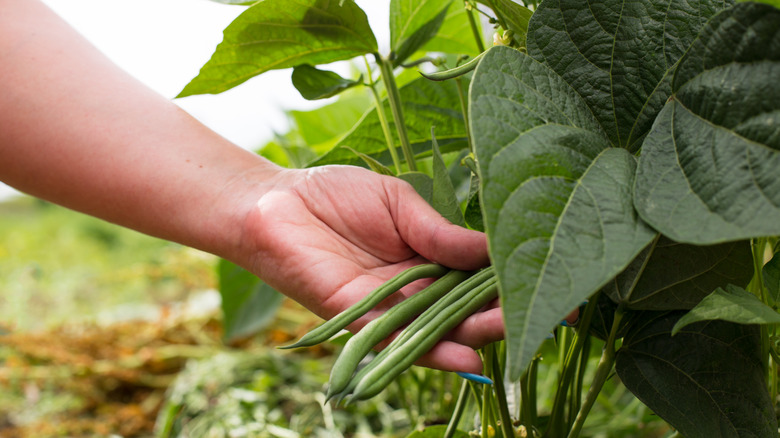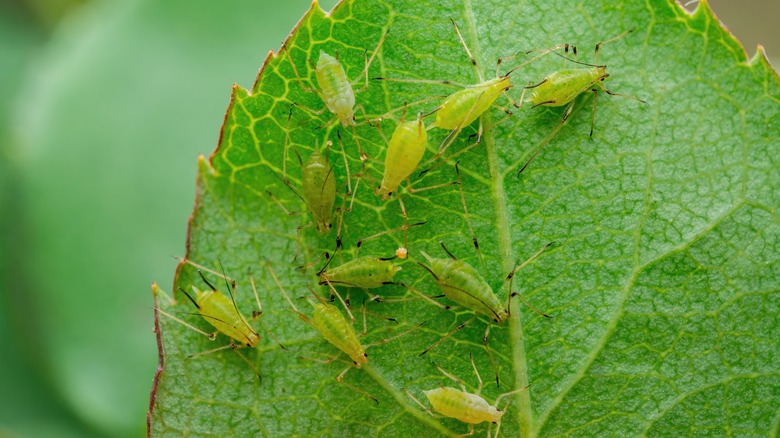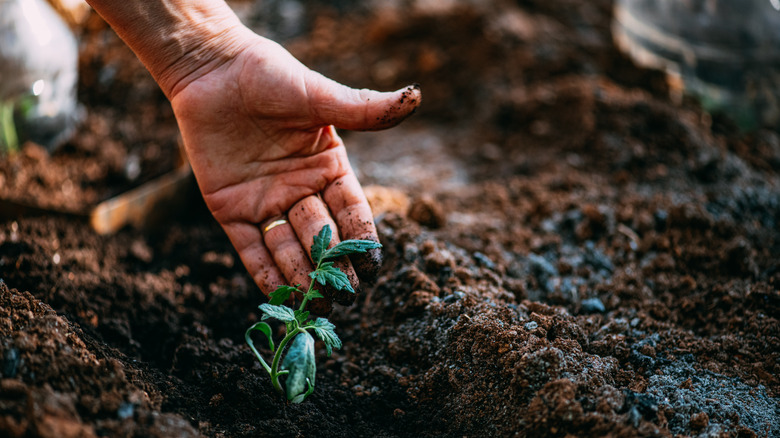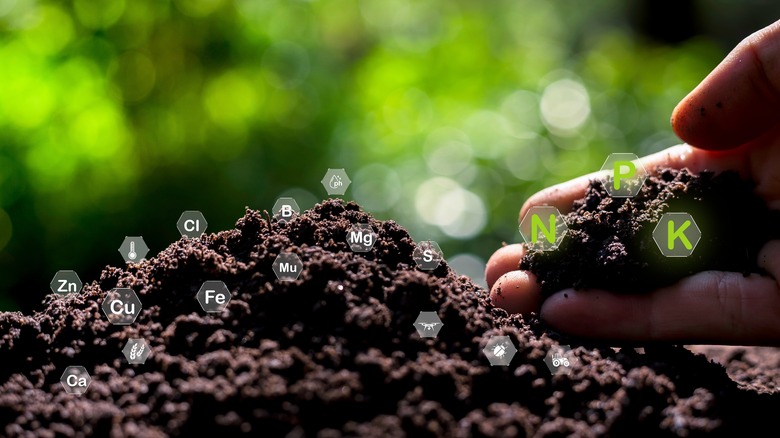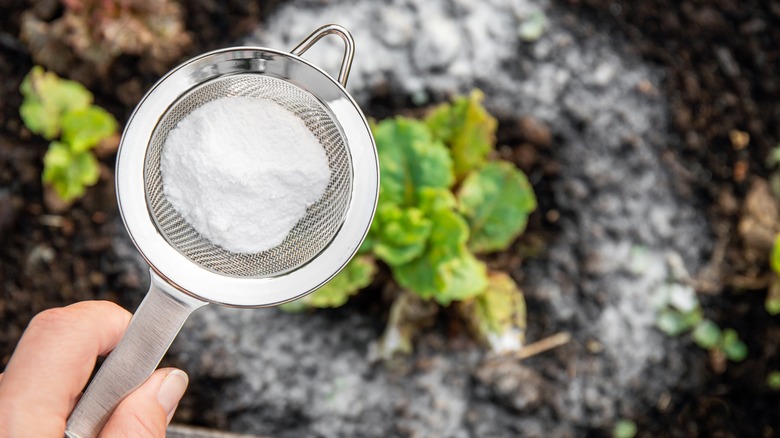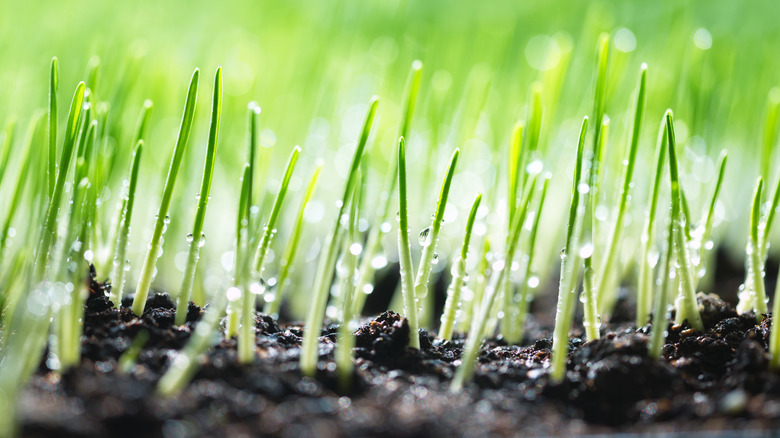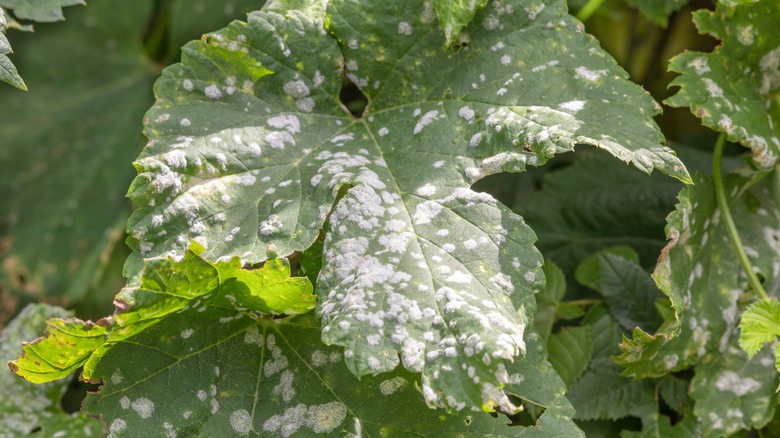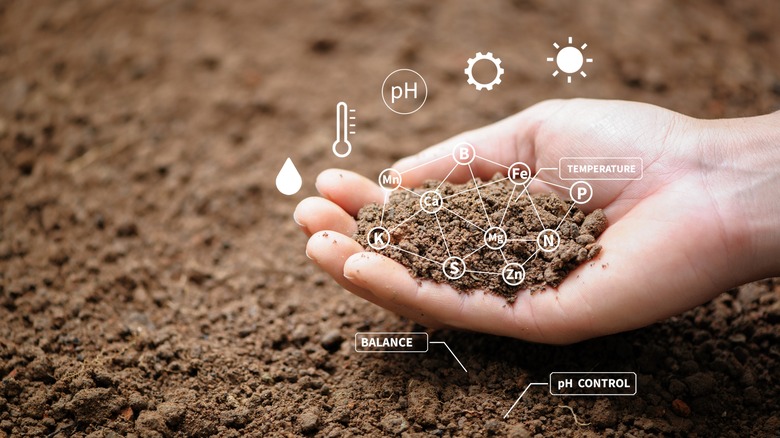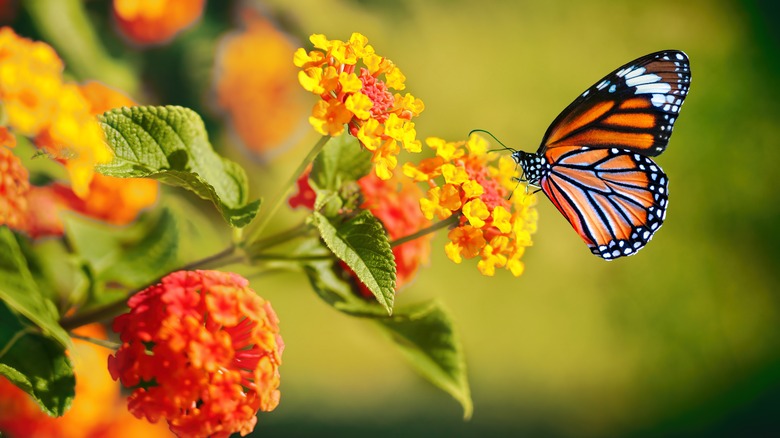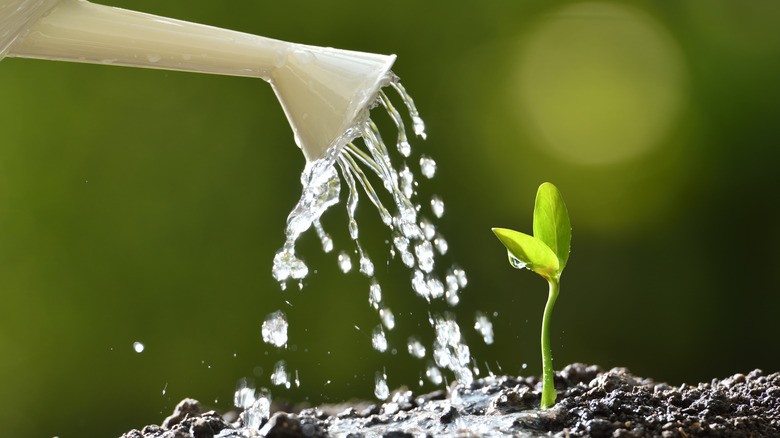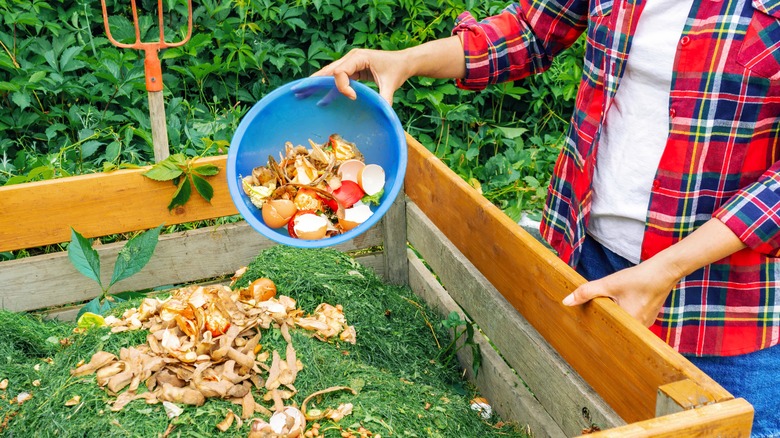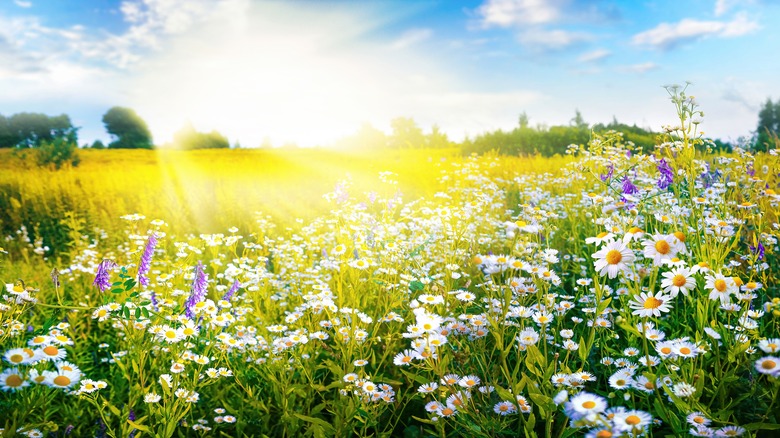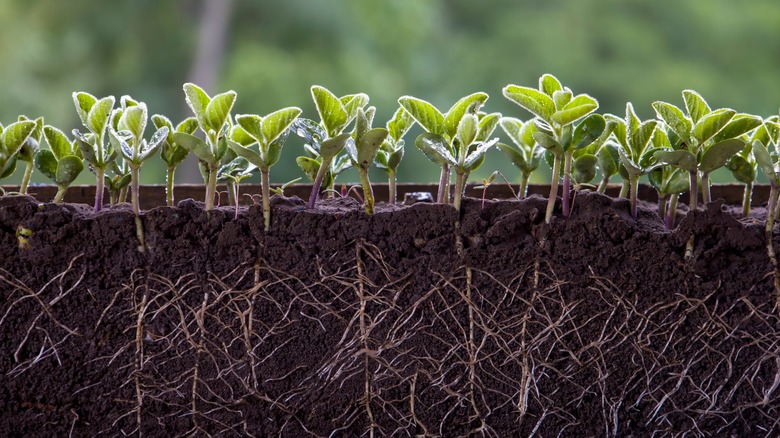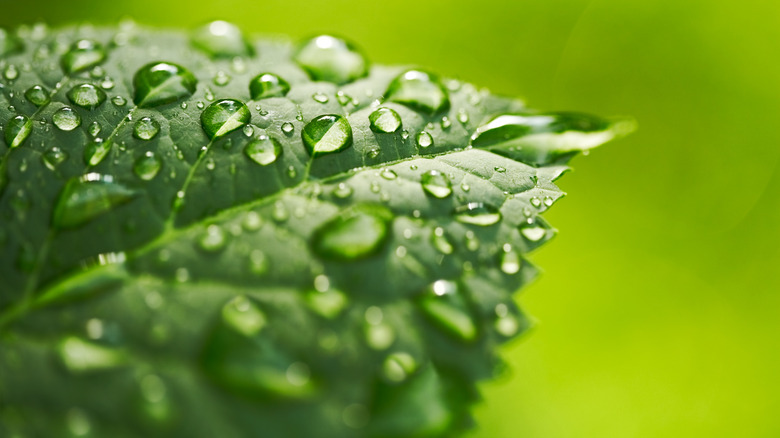13 Things That Happen When You Put Soap In Your Garden
Beginner gardeners quickly realize that gardening is a nuanced endeavor that encompasses intricate techniques, such as precision planting, soil amendments, and pest management strategies. But experienced gardeners know that growing a lush yard more often stems from a few simple tricks — like using household soap.
Have you ever considered the transformative potential that lies within this unassuming homely item for your garden? That's right; the power of soap extends beyond the bathroom or kitchen sink to become a tool in your gardening repertoire. Prepare to be astonished as we unravel the myriad ways in which soap— bar, liquid, or foam— can emerge as a game-changer, breathing new life into your plants, nurturing the soil beneath, and elevating the overall health of your garden to unprecedented heights. As we embark on this exploration, we'll uncover the hidden science, unveil the practical applications, and share the fascinating tales of how ordinary soap can orchestrate a symphony of positive effects in your outdoor haven.
So, step into the garden with us, where soap can unfold its secrets and work its magic, offering a fresh perspective on cultivating a thriving, vibrant, and eco-friendly oasis right in your backyard.
Soap can shield your plants from pests
In the perpetual battle between the green-thumbed gardener and relentless garden pests, an unlikely hero emerges — the humble bar of soap. Contrary to typical chemical-laden solutions, soap offers a natural and effective defense for your cherished plants.
The secret lies in the soap's composition. Soap molecules consist of water-attracting and water-repelling ends. According to an article published in HortTechnology, when applied to plants, soap disrupts the cells of soft-bodied insects, causing dehydration and ultimately deterring them from making a feast of your garden foliage. Unlike chemical pesticides that indiscriminately eliminate both harmful and beneficial insects, soap selectively targets pests while preserving the delicate allies in your garden. Ladybugs, lacewings, and predatory beetles, which play a crucial role in keeping harmful insect populations in check, remain unharmed because of their hard outer shells, fostering a balanced and sustainable ecosystem within your garden. For larger pests, like chipmunks, Katie Femia, via The Homespun Hydrangea, recommends grating a bar of soap and sprinkling the gratings around your plants. This targeted approach helps in curbing infestations and preventing the potential damage these tiny invaders can inflict on your plants.
Beyond its effectiveness, the use of soap as a pest repellent aligns with environmentally conscious gardening practices. Unlike synthetic chemicals that can persist in the soil and water, soap breaks down into harmless components, minimizing its impact on the broader ecosystem. This eco-friendly characteristic makes it a responsible choice for gardeners seeking sustainable alternatives.
Soap can improve soil structure
Beyond its role in fending off garden pests, soap unveils yet another facet of its gardening prowess — the ability to transform soil structure. In a symphony of scientific marvels, soap contributes to better aeration and water retention, laying the foundation for healthier, more robust plant growth.
At the heart of soap's impact on soil lies its unique ability to form micelles (via the Journal of Environmental Management) — clusters of molecules that arrange themselves in water. When introduced to the soil, soap molecules facilitate the breakdown of compacted soil particles. This process, known as flocculation, results in the creation of channels and spaces, improving soil aeration. Enhanced aeration allows for the proliferation of beneficial microorganisms crucial for soil health.
The positive effects of soap on soil structure extend beyond immediate improvements. Over time, garden soil can become compacted, hindering root growth and impeding the circulation of water and nutrients. Soap, with its soil-loosening properties, mitigates compaction by breaking down the forces that bind soil particles together. The result is a friable and receptive soil structure that allows plant roots to navigate freely, promoting healthy growth and facilitating the penetration of vital nutrients. By breaking the cycle of compaction and enhancing aeration, soap contributes to the long-term enrichment of your garden soil. This not only benefits existing plants but also sets the stage for successful cultivation in subsequent seasons.
Soap can enhance your plants' abilities to absorb nutrients
Beyond its cleansing virtues, soap plays a pivotal role in enhancing nutrient absorption for plants. This is primarily due to its surfactant nature. Surfactants possess the remarkable ability to reduce the surface tension of liquids. When soap is introduced to the soil, it breaks surface tension in water that is under soil, allowing it to more effectively penetrate the root zone. This increased water mobility ensures that essential nutrients are carried to the roots, promoting optimal uptake by plant cells.
In certain soils, nutrients may become tightly bound to soil particles, creating a barrier that impedes their availability to plant roots. Soap aids in breaking down these barriers by facilitating the dispersion of nutrients in the soil solution. This liberation of nutrients from their mineral constraints ensures that plants can access a broader spectrum of essential elements for sustained growth.
Soil contains a complex matrix of minerals that interact with plant roots. According to an article in the Journal of the American Oil Chemists Society, soap enhances the exchange of these minerals. between itself and those in the soil, enabling plant roots to absorb essential nutrients more efficiently. By fostering nutrient availability and improving soil structure, soap indirectly supports the microbial community in the soil. Beneficial microbes play a crucial role in breaking down organic matter, releasing nutrients in forms that are readily accessible to plants. This symbiotic relationship amplifies the nutrient absorption efficiency of your garden, contributing to the vitality of your plants.
Soap can eliminate weeds without harmful chemicals
Far removed from the harsh chemicals typically associated with weed control, soap presents itself as a powerful and gentle alternative. The soap molecules disrupt the cell membranes of weed foliage, leading to cellular leakage and desiccation. Unlike conventional chemical herbicides, soap-based weed control is targeted and selective. This mechanism effectively targets weeds without leaving behind harmful residues that can persist in the soil or pose a risk to other plants, insects, or animals.
One of soap's most commendable attributes in weed control lies in its biodegradability. Unlike synthetic herbicides that can persist in the environment, soap breaks down into harmless components over time. This not only minimizes the risk of soil contamination but also contributes to overall soil health, fostering a sustainable and resilient ecosystem in your garden.
Gardeners have embraced the simplicity of soap-based weed control through easy-to-create DIY recipes, like this "natural weed killer" from HGTV. By combining liquid soap with other natural ingredients such as vinegar or essential oils, you can concoct a potent yet environmentally friendly weed-killing solution. These homemade recipes offer a personalized touch to your weed management strategy, minimizing reliance on commercially available chemical alternatives.
Germinate seeds faster with this soap concoction
Seeds are often encased in protective coats that serve as shields against the elements. However, these coats can also act as impediments to timely germination. Soap disrupts this dormancy by assisting in the breakdown of seed coats. As a result, the internal embryo is exposed to the necessary elements for germination, signaling the start of the plant's life cycle. This soap-induced absorption triggers a cascade of enzymatic processes within the seed. These enzymes spring into action, initiating metabolic activities crucial for germination. The result is a rapid transition from a latent seed to an actively growing seedling, setting the stage for robust plant development.
Soap's role isn't confined to the seed alone; it extends to the soil-water interface. By enhancing water penetration into the soil, soap ensures that seeds are enveloped in a uniformly moist environment, ideal for germination. This optimized soil-water dynamic creates conditions where seeds can imbibe water swiftly, hastening the initiation of germination.
Perhaps the most rewarding outcome of soap's germination acceleration is the potential head start it provides your garden in the growing season. With seeds sprouting earlier and seedlings developing more rapidly, your garden could gain a competitive edge over your neighbors, maximizing the time available for lush foliage, vibrant blooms, and bountiful harvests.
Shield your garden against fungal diseases
The surfactant nature of soap comes into play once again, proving to be a formidable adversary against fungal diseases. When soap is applied to plant surfaces, it disrupts the membranes of fungal cells. Fungi often reproduce through spores that can germinate on plant surfaces, leading to infections. Soap, when used preventively, creates an unfavorable environment for fungal spore germination. By interfering with the spores' ability to establish themselves on plant tissues, soap acts as a proactive barrier against the initiation of fungal infections.
Soap doesn't just combat fungi directly; it also stimulates the plant's natural defense mechanisms, as detailed in an article published in Microbial Pathogenesis. When applied, soap triggers a response from the plant, prompting the production of defense-related compounds. These compounds fortify the plant's immune system, according to a 1996 review in Trends in Plant Science, creating an inhospitable environment for fungal pathogens and bolstering the plant's ability to resist infection. Fungal diseases often thrive in humid conditions, making plants more susceptible to infections during periods of high moisture. Soap, by disrupting fungal structures and preventing spore germination, provides an additional layer of protection during humid weather. This is especially valuable in regions or seasons where humidity poses a heightened risk of fungal outbreaks.
Soap's effectiveness extends across a spectrum of common fungal diseases, including powdery mildew, black spot, and rust. Whether you're cultivating roses, vegetables, or ornamental plants, soap's broad-spectrum action makes it a versatile and reliable ally in your ongoing battle against fungal threats.
Soap can bring (pH) balance to your soil
The pH level of soil, representing its acidity or alkalinity, is a critical factor influencing nutrient availability to plants. Soap, with its pH-buffering properties, acts as a stabilizing force. When fluctuations in soil pH occur due to factors like extreme weather or the breakdown of organic matter, soap helps buffer these changes. This effect ensures that the soil maintains a more stable and optimal pH range for plant growth.
In regions where soil tends to be overly acidic, soap can alleviate this condition. Acidic soils can limit nutrient availability, stunting plant growth. Soap, with its alkaline nature, counteracts soil acidity, creating a more neutral pH environment. This adjustment enhances the accessibility of essential nutrients, promoting healthier and more vigorous plant development. Conversely, in areas where soil tends to be excessively alkaline, soap serves as a counterbalance. Alkaline soils can impede nutrient uptake by plants, leading to deficiencies. Soap's slightly acidic properties contribute to counteracting soil alkalinity, bringing the pH closer to the optimal range for a broader spectrum of plants. This adjustment fosters an environment where diverse plant species can coexist and thrive.
A pH-balanced soil environment is welcoming to a diverse range of plants with varying pH preferences. Soap's ability to create and maintain this equilibrium encourages the coexistence of different plant species in your garden. From acid-loving to alkaline-tolerant varieties, soap fosters a harmonious botanical community that enhances the visual appeal and ecological richness of your outdoor space.
Soap could bring all the good bugs to your yard
Beyond its conventional use, soap unveils a secret talent — the ability to attract beneficial insects, transforming your garden into a horticultural haven. Soap, when diluted and strategically applied, can mimic the appearance and scent of flowers. Many beneficial insects, including pollinators like bees and butterflies, are naturally drawn to the fragrances and colors associated with blossoms. By incorporating soap into your gardening routine, you create an enticing environment that mimics the allure of nectar-rich flowers, effectively attracting these indispensable pollinators.
Predatory insects such as ladybugs, lacewings, and predatory beetles play a crucial role in maintaining a balanced ecosystem by preying on harmful pests. Soap can act as a lure, attracting these beneficial insects to your garden. Once in the vicinity, they become active participants in pest control, keeping populations of garden-damaging insects in check through natural predation.
Soap's role in attracting beneficial bugs goes beyond the beauty of blooming flowers. By inviting bees, butterflies, and other pollinators to your garden, soap facilitates natural pollination. This, in turn, enhances the productivity of your plants, leading to increased fruit and seed production, and ultimately contributing to a more abundant harvest.
Soap can increase your watering's efficiency
Soap's surfactant action not only aids in breaking surface tension, as we mentioned before, but also enhances the absorption of water by soil particles. This results in a more uniform distribution of moisture throughout the root zone. The enhanced water absorption ensures that a larger volume of soil is effectively hydrated, optimizing the conditions for plant roots to uptake essential nutrients and thrive. This not only maximizes the use of water but also prevents soil erosion and nutrient loss associated with runoff. For container plants, where water efficiency is crucial, soap can be particularly beneficial. The surfactant properties of soap aid in permeating the compacted growing medium of containers, ensuring that water reaches the depths of the container rather than pooling at the surface. This targeted approach optimizes water usage and supports the health of potted plants.
In regions prone to drought or water scarcity, soap becomes a valuable ally in optimizing watering efficiency. By facilitating better water absorption and reducing surface tension, soap helps plants develop stronger, more resilient root systems. This, in turn, enhances their ability to withstand periods of drought, ensuring the long-term health and survival of your garden.
Soap's contribution to improved watering efficiency aligns with sustainable gardening practices. By enhancing the effectiveness of water application, soap allows you to achieve optimal hydration for your plants with less water consumption. This eco-friendly approach promotes water conservation and supports a more sustainable and responsible use of this precious resource.
Soap can act as a compost accelerator
Composting requires an optimal moisture balance, and soap contributes to this equilibrium. By enhancing water retention in the compost pile, soap ensures that microbes have a consistently moist environment to thrive in. This not only fosters their activity but also prevents the compost from drying out, promoting a more effective decomposition process.
Certain kitchen scraps, like citrus peels and avocado skins, can be more resistant to decomposition. Soap aids in breaking down the tough cell walls of these materials, making them more accessible to microbial action. This accelerates the decomposition of otherwise slower-to-break-down components, ensuring a more thorough and timely transformation of kitchen waste. In addition, soap contributes to maintaining the ideal carbon-to-nitrogen (C/N) ratio in your compost pile. Balancing this ratio is crucial for efficient decomposition, as explained in a 2014 article in Bioresource Technology. Kitchen waste often has a higher nitrogen content, and soap, by aiding in the breakdown of carbon-rich materials like cardboard or straw, ensures a harmonious C/N balance that supports the thriving microbial community responsible for decomposition.
Those who compost know that composting can sometimes be accompanied by unpleasant odors, especially when anaerobic conditions prevail. Beyond all the benefits in the actual composting process, soap's role in enhancing aeration not only accelerates decomposition but also helps control odors. This helps your compost pile remain a fragrant-free zone, making the composting experience more pleasant.
Soap can help shed some light on your garden
In the sunlit theater of photosynthesis, where plant leaves perform their botanical ballet, the unassuming bar of soap emerges as a backstage magician, casting a spell that enhances the absorption of sunlight. When diluted and applied to plant leaves, soap breaks down the surface tension of water droplets. This results in a thin, even film of water covering the leaves. The thin film of water created by soap serves as a light-conductive medium. As light encounters this film, the potential for reflection is minimized. According to a 2018 review published by Transformative Plant Biotechnology, reduced reflection means that more light is absorbed by the leaves, increasing the efficiency of photosynthesis. This optimization ensures that a greater proportion of available sunlight contributes to the energy production process within the plant.
Soap's influence extends to the wettability of plant leaves. By promoting increased leaf wettability, soap ensures that water adheres more readily to the leaf surface. This creates an environment where water and sunlight work synergistically, enhancing the absorption of both elements. Improved leaf wettability contributes to the overall health and vigor of the plant.
As a result of soap's impact on surface tension, moisture distribution, light reflection, and leaf wettability, plants experience improved conditions for photosynthesis. Enhanced sunlight absorption sets the stage for optimal photosynthetic activity, ensuring that your garden thrives with increased energy production, lush foliage, and better overall growth.
Increase root resilience with soap
Beneath the surface of your garden, where roots weave the intricate tapestry of plant life, soap can reinforce the foundation for long-term health. Foremost, while water is essential, excessive moisture can be detrimental to root systems, leading to waterlogging. Soap's surfactant action helps prevent waterlogging by improving soil drainage. This ensures that excess water moves away from the root zone, preventing conditions that could compromise root health. The avoidance of waterlogged soil contributes to the overall strength and resilience of the root system.
As we already know, soap aids in the absorption of nutrients by roots. By improving water penetration and creating a conducive soil environment, soap ensures that essential nutrients are more readily available to the roots. This enhanced nutrient uptake supports the development of a robust root system, providing the foundation for the overall health and vitality of your plants. In addition, compacted soil can impede root growth, limiting the spread and penetration of roots. Since soap contributes to mitigating soil compaction by improving soil structure, roots encounter less resistance in their quest for expansion, allowing them to develop more freely and establishing a solid foundation for the long-term health of your garden.
Soap can result in sparkling foliage
The visual impact of incorporating soap into your garden extends beyond mere cleanliness. By harnessing the cleansing properties of soap, your plants' natural radiance can be amplified. As soap gently dissolves and lifts away accumulated dust and debris from the leaves, it unveils surfaces that are not just cleaner but also shinier. This process goes beyond cosmetic enhancement, as clean leaves are better positioned to absorb sunlight efficiently. The enhanced reflectivity of the foliage creates a mesmerizing play of light, infusing your garden with a dynamic vibrancy that captivates the beholder.
Moreover, the shinier foliage contributes to the overall perception of plant health. The glossiness reflects a well-maintained environment where plants are thriving and receiving the care they deserve. As the soap's cleansing properties strip away pollutants and potential pest residues, the leaves stand as a testament to your commitment to fostering a healthy and vibrant garden.
This visual transformation is not only a treat for the eyes but also a holistic indicator of your garden's well-being. The cleaner, shinier foliage is not merely a cosmetic enhancement but a dynamic expression of the symbiotic relationship between your plants and the thoughtful care you invest in their growth. In the reflection of sunlight on glistening leaves, your garden tells a story of vitality, cleanliness, and a nurturing touch, creating a visual impact that goes beyond the surface to the very essence of a flourishing and well-cared-for botanical haven.
